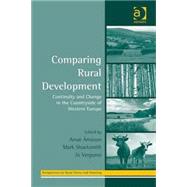Comparing Rural Development: Continuity and Change in the Countryside of Western Europe
, by -rnason,Arnar- ISBN: 9780754675181 | 0754675181
- Cover: Hardcover
- Copyright: 1/28/2009
At a time when there is major reorientation of rural economies in the west and east of Europe, and the emergence of new possibilities both for governance and for conflict, this book brings together a group of leading European academics in the fields of geography, sociology and anthropology to examine how such changes take place.It describes, analyses and theorises the role of networks and social capital in rural development in six countries: Finland, Ireland, Italy, Norway, Scotland and Sweden, and also addresses the tension between studying 'local' rural development and the 'globalised' nature of modern economies and societies.The social capital approach is used as a way of drawing attention to the non-economic dimensions of rural development and society. This means that the minutiae of local social life - why, for example, do people repeatedly volunteer their time and effort in a concert venue set in an old limestone quarry in Sweden? - are as important as European-wide rural restructuring, such as the reform of the Common Agricultural Policy or models for the provision of rural services. The book stresses that the links between society and economics are of key importance.Crucially, the book is structured according to analytic themes rather than geographic areas. As the contribuotrs have been taking part in three years of intensive communication as part of an EU-funded research project, the chapters have a strong comparative element to them. The book focuses particularly on social networks, services, gender, identity, and environments. It concludes by describing how heterogeneity and inclusiveness are key criteria for successful social capital and networks, and examine these in regard to issues of 'visibility' and social identity in rural Europe.







